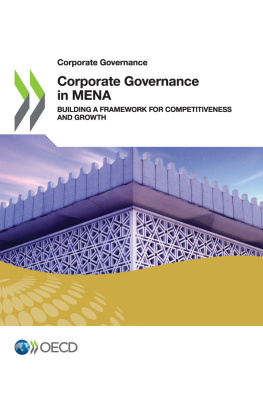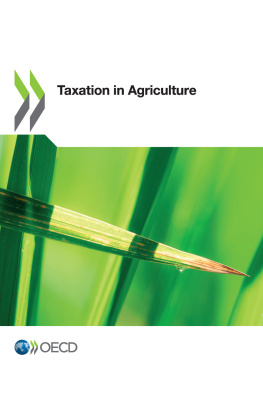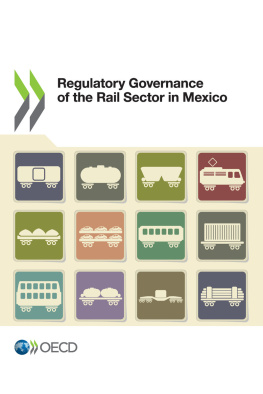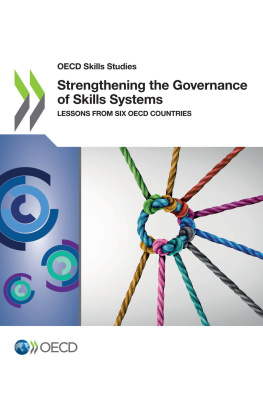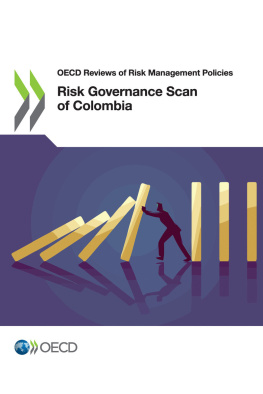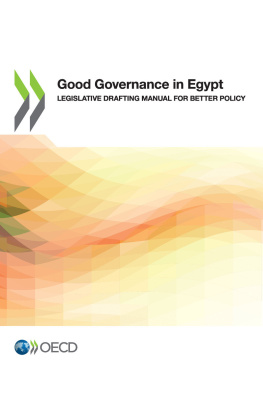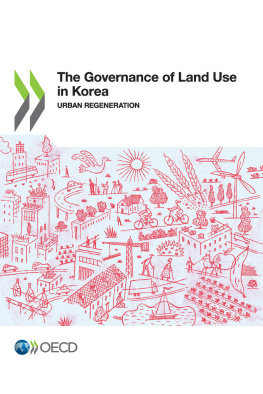OECD - Corporate Governance in MENA
Here you can read online OECD - Corporate Governance in MENA full text of the book (entire story) in english for free. Download pdf and epub, get meaning, cover and reviews about this ebook. year: 2019, publisher: OECD Publishing, genre: Business. Description of the work, (preface) as well as reviews are available. Best literature library LitArk.com created for fans of good reading and offers a wide selection of genres:
Romance novel
Science fiction
Adventure
Detective
Science
History
Home and family
Prose
Art
Politics
Computer
Non-fiction
Religion
Business
Children
Humor
Choose a favorite category and find really read worthwhile books. Enjoy immersion in the world of imagination, feel the emotions of the characters or learn something new for yourself, make an fascinating discovery.
Corporate Governance in MENA: summary, description and annotation
We offer to read an annotation, description, summary or preface (depends on what the author of the book "Corporate Governance in MENA" wrote himself). If you haven't found the necessary information about the book — write in the comments, we will try to find it.
OECD: author's other books
Who wrote Corporate Governance in MENA? Find out the surname, the name of the author of the book and a list of all author's works by series.
Corporate Governance in MENA — read online for free the complete book (whole text) full work
Below is the text of the book, divided by pages. System saving the place of the last page read, allows you to conveniently read the book "Corporate Governance in MENA" online for free, without having to search again every time where you left off. Put a bookmark, and you can go to the page where you finished reading at any time.
Font size:
Interval:
Bookmark:
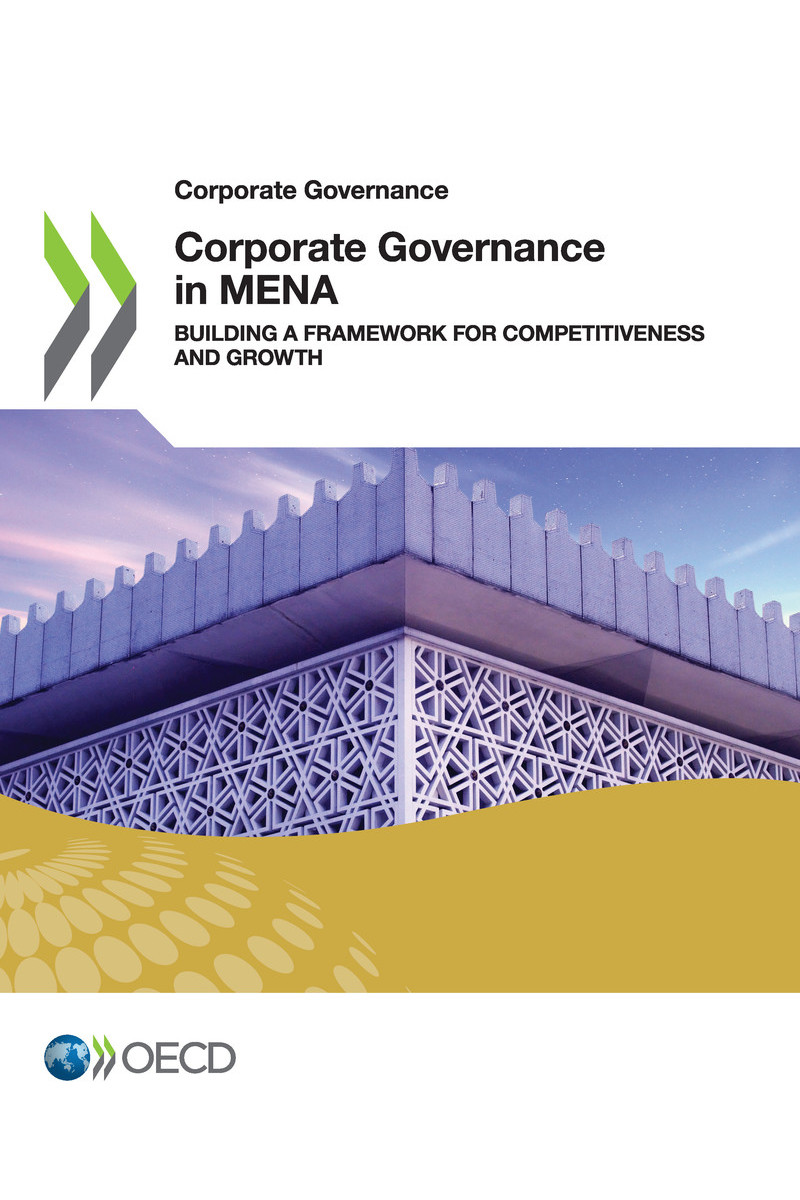
OECD (2019), Corporate Governance in MENA: Building a Framework for Competitiveness and Growth , Corporate Governance, OECD Publishing, Paris.
https://doi.org/10.1787/2a6992c2-en
Sound corporate governance is a means of supporting the drivers of economic growth: efficient capital markets, quality investment and a favourable business climate. Achieving the economic ambitions of Middle East-North Africa (MENA) economies can be supported by ongoing improvements in corporate governance policies and practices and an alignment with international standards.
Ensuring a sound corporate governance framework goes beyond enhancing company performance and access to capital. Fostering an environment of trust, transparency and accountability is integral to boosting capital market development and competitiveness. In the context of increasingly integrated global capital markets, where institutional investors are more present,, it is essential to improve overall governance, transparency and disclosure, to facilitate access to capital and to increase gender balance on boards.
MENA economies have undertaken reforms to encourage sound corporate governance practices. However, progress takes time. The number of women on corporate boards remains low. Other challenges include the reporting and disclosure of board information (remuneration, qualifications, etc.); the protection of minority investors; related party transactions; and beneficial ownership structures. Access to corporate finance also remains limited in some economies, and improvements in the governance of state-owned enterprises (SOEs) are needed. Targeted reforms in these areas will contribute both to enhancing company performance and to boosting the regions potential for inclusive growth and competitiveness.
This publication presents the recent evolution of MENA corporate governance frameworks and practices in four thematic areas: access to capital; transparency and disclosure; gender balance in corporate leadership; and governance of SOEs. These topics are addressed in reference to the G20/ OECD Principles of Corporate Governance and the OECD Guidelines on Corporate Governance of SOEs . Each chapter identifies common challenges and proposes policy reforms. The experiences and practices of OECD countries are also presented throughout the report to enrich the analysis, and each chapter identifies key opportunities for increasing the capacities of relevant authorities and institutions overseeing corporate governance policies.
The report draws upon extensive research, policy discussions at the international and regional levels, and insights from national experts through focus groups. It contributes to a growing body of OECD work aimed at fostering sound corporate governance in MENA economies with the aim of furthering the regions development and prosperity.

Dr. Obaid Saif Al Zaabi
Chief Executive Officer
Securities & Commodities Authority
United Arab Emirates

Ms. Gabriela Figueiredo Dias
Chairperson
Comisso do Mercado de Valores Mobilirios (CMVM)
Portugal
The MENA-OECD Competitiveness Programme was launched in 2016 at the request of MENA governments. It covers the following jurisdictions: Algeria, Bahrain, Djibouti, Egypt, Iraq, Jordan, Kuwait, Lebanon, Libya, Mauritania, Morocco, Oman, Palestinian Authority, Qatar, Saudi Arabia, Tunisia, United Arab Emirates and Yemen.
The programmes objective is to mobilise investment, private-sector development and entrepreneurship in order to support economic growth and employment in the Middle East-North Africa region. To achieve this objective, the programme adopts a horizontal approach of policy dialogue and consensus building through the exchange of experiences and good practices, as well as capacity building, to identify, implement and monitor business climate reforms. It provides a platform for OECD and MENA economies to discuss strategic responses to common challenges in the region, to explore ways to boost inclusive growth and employment, and to foster regional and international integration.
The MENA-OECD Competitiveness Programme builds on work conducted under the 2005 MENA-OECD Investment Programme, and includes activities by the MENA-OECD Working Group on Corporate Governance. The Working Group supports the development of sound corporate governance frameworks and policies, which are essential building blocks for boosting competitiveness, promoting private-sector development and attracting capital. The Working Group supports reform efforts in MENA, using the G20/OECD Principles of Corporate Governance and OECD Guidelines on Corporate Governance of State-Owned Enterprises as a benchmark to enhance implementation of the regions policy priorities. The work on corporate governance feeds into and draws on other work streams under the Competitiveness Programme.
Through the MENA-OECD Competitiveness Programme, the OECD provides policy advice underpinned by comparative analytical work with a view to support policy formation and implementation at the national and regional levels in MENA economies. Building on a decade of experience, this approach promotes co-operation and mutual learning among relevant players, including regional and international public institutions and the private sector.
Font size:
Interval:
Bookmark:
Similar books «Corporate Governance in MENA»
Look at similar books to Corporate Governance in MENA. We have selected literature similar in name and meaning in the hope of providing readers with more options to find new, interesting, not yet read works.
Discussion, reviews of the book Corporate Governance in MENA and just readers' own opinions. Leave your comments, write what you think about the work, its meaning or the main characters. Specify what exactly you liked and what you didn't like, and why you think so.

